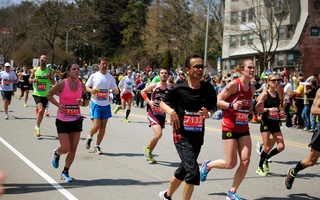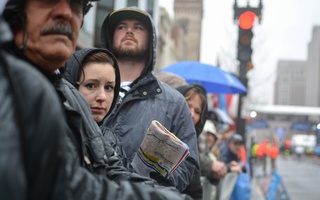Harvard had been around for well over a century by the time April 19, 1775 rolled around. What transpired that day will never be forgotten, as our nation’s founders fought the Battles of Lexington and Concord—the opening battles of the American Revolutionary War. In 1894, to commemorate this revolutionary fight for American ideals—including liberty, equality, democracy, and tolerance—Harvard alumnus and Massachusetts Governor Frederic Greenhalge declared April 19 Patriots’ Day, now celebrated on the third Monday of April. Public high schools, public colleges, and state-based offices all close to observe Patriots’ Day. Boston College, Boston University, Northeastern, Wellesley College, Holy Cross, Babson, Tufts, Emerson, Suffolk University, Bentley, and UMass all respect this state-wide holiday. Wait. What about that other school in Cambridge? Yes, MIT does too.
While following suit isn’t typical of Harvard, it is high time that Harvard respected and honored Patriots’ Day. After all, military service is the ultimate display of patriotism, and as Dean Khurana so frequently and eloquently states, “other than the two oldest military academies, no institution has given more lives in service of its nation than Harvard College. And other than the two oldest military academies, no institution has more people who’ve been awarded the Medal of Honor than the College.”
Perhaps no event symbolizes Patriots’ Day quite like the Boston Marathon, which links the Athenian and American struggles for liberty (the word marathon is derived from the Greek Battle of Marathon). Beginning in Hopkinton and stretching 26.2 miles to the finish line on Boylston Street in Boston, the Boston Marathon is both the world’s oldest and most iconic annual marathon. It was first run in 1897 and has always taken place on Patriots’ Day to memorialize the pursuit of liberty. The prestigious race featuring exclusive qualifying times still marks an extraordinary platform for showcasing toughness, durability, endurance, and commitment from top performers, but an amendment to the qualifying rules now reserves spots for a few fundraising charities.
This year alone runners from these charities have combined to fundraise over $28 million. As the most-watched live sporting event in New England, the marathon draws over 500,000 spectators annually. But spectators do more than watch the race. By distributing waters and snacks, making signs, cheering, and in some cases even running a portion of the race, spectators provide a huge morale boost to all runners, even those they don’t even know. Taking into account all of the contributions of volunteers, supporters, and the runners themselves, the Boston Marathon brings together millions of participants every year in an inclusive and patriotic way. Unfortunately, Harvard students are left out of this quintessential coming together of the greater Boston community.
So why is it such a big deal now?
For as much patriotism and pride as Patriots’ Day gave Boston and the surrounding area before April 15, 2013, the Boston bombings that took place on that fateful day—taking the lives of three and injuring hundreds more—have elevated the marathon to another level. Boston Strong, a rallying cry that has become emblematic of the city’s impassioned and defiant response to the bombings, represents the unbreakable bond that unifies the entire state. Everyone in Massachusetts shares the pride of being a Bostonian.
For such a heart-wrenching atrocity, the response was uniquely incredible. The entire state worked together to help the injured and minimize damage. An attempt to break Boston’s back only invigorated it. The city rallied and the entire state of Massachusetts came together to recognize its heroes and move forward. This past December, Mark Wahlberg starred in Patriots Day, a commemorative film that does justice to the tragic events and the inspiring response of the entire state.
Every student studying in Massachusetts has the right to truly experience Patriots’ Day in Boston. It’s part of the experience of coming to school here, and barring students from having the opportunity to do so hinders our collective experience at this otherwise empowering institution. In many ways, keeping us from experiencing this community-oriented day further strengthens the grip of the Harvard bubble and promotes a culture that fails to concern itself with the very community in which it thrives.
For all of the inclusivity, unity, and community-building efforts that Harvard publicly promotes, failing to honor such an important day in this nation’s history is disrespectful. After graduating from the College, Harvard students won’t remember the 23rd lecture of today's classes. They would, however, remember the moving experience of Patriots’ Day shared with classmates and all of the greater Boston community.
I encourage anyone who hasn’t yet seen the Boston Marathon—Mile 21 and the finish line are the best viewing spots—to make the effort at least one year over your time at Harvard. It truly is one day when everyone is a Bostonian, and it’s amazing what unity can accomplish. I hope that sometime soon it will be part of the academic calendar, but until then, feel free to join me and a large cohort of Harvard students in excusing ourselves for the day to be a Patriot.
Mark Czeisler ’19 is a neurobiology concentrator in Quincy House.
Read more in Opinion
Night RunRecommended Articles
-
Marathon Runners Train For Boston Spring RacesAfter the St. Patrick's Day Parade, the true Bostonian's heart turns to road running, and for the competitive type, there
-
Soaking Up the BenniesJock and the Boston Baddies If Boston is no longer a major league town, as some claim, it is not
-
 Remembering Marathon Attacks, Students Grapple with Death Penalty
Remembering Marathon Attacks, Students Grapple with Death Penalty -
 Why Don't We Have Marathon Monday Off? All the Other Kids Do
Why Don't We Have Marathon Monday Off? All the Other Kids Do -
 Bombing Memories Still Lingering, Harvard Affiliates Run Marathon
Bombing Memories Still Lingering, Harvard Affiliates Run Marathon













